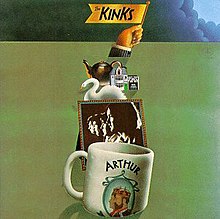She's Bought a Hat Like Princess Marina
| Arthur (Or the Decline and Fall of the British Empire) | ||||
|---|---|---|---|---|
 |
||||
| Studio album by The Kinks | ||||
| Released | 10 October 1969 | |||
| Recorded | May–July 1969 at Pye Studios, London | |||
| Genre | Rock | |||
| Length | 49:17 | |||
| Label | Pye (UK), Reprise (US) | |||
| Producer | Ray Davies | |||
| The Kinks chronology | ||||
|
||||
| Singles from Arthur | ||||
|
||||
Arthur (Or the Decline and Fall of the British Empire) is the seventh studio album by English rock band the Kinks, released in October 1969. Kinks frontman Ray Davies constructed the concept album as the soundtrack to a Granada Television play and developed the storyline with novelist Julian Mitchell; however, the television programme was cancelled and never produced. The rough plot revolved around Arthur Morgan, a carpet-layer, who was based on Ray and guitarist Dave Davies' brother-in-law Arthur Anning. A mono version was released in the UK, but not in the US. It is now available on the 2011 deluxe-edition re-issue.
Arthur was met with nearly unanimous acclaim upon release. It received generous coverage in the US rock press, with articles running in underground magazines such as Fusion and The Village Voice. It garnered back-to-back reviews by Mike Daly and Greil Marcus in Rolling Stone magazine's lead section; Daly rated it "the Kinks' finest hour", and Marcus ranked it "the best British album of 1969". Reviews in the UK were also positive. Although Arthur received a mixed review in New Musical Express, Disc & Music Echo praised the album's musical integrity, and Melody Maker called it "Ray Davies' finest hour ... beautifully British to the core".
The album, although not very successful commercially, was a return to the charts in the US for the band. Their previous effort, The Kinks Are the Village Green Preservation Society, received acclaim from critics but failed to chart in any country upon its 1968 release, with total US sales estimated at under 25,000 copies. The Kinks returned to the Billboard charts in 1969 after a two-year absence, with the lead single from the record, "Victoria", peaking at number 62. The album itself reached number 50 on the Record World charts, and number 105 on Billboard, their highest position since 1965. It failed to chart in Britain. Arthur paved the way for the further success of their 1970 comeback album Lola Versus Powerman and the Moneygoround, Part One and its accompanying US Top 10 and UK Top 5 hit "Lola".
...
Wikipedia
